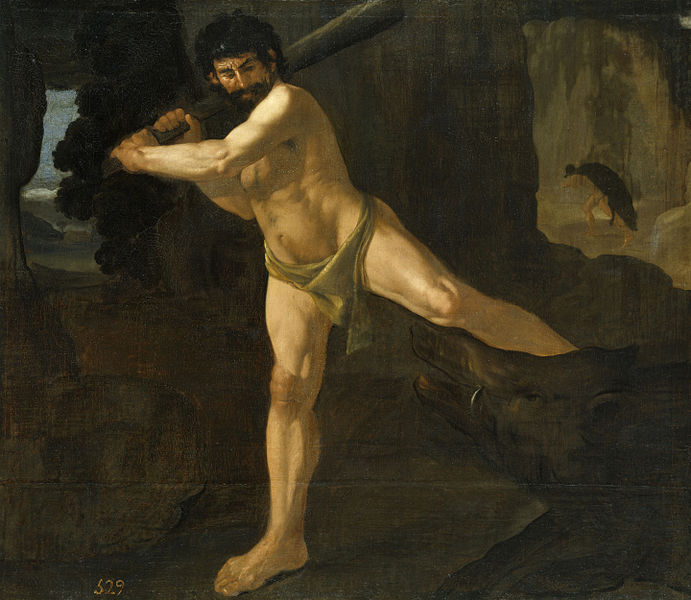THE ERYMANTHIAN BOAR IN GREEK MYTHOLOGY
The Erymanthian Boar was one the beasts spoken of in accounts of Greek mythology; gigantic in size, the Erymanthian Boar was a deadly animal to those mortals who encountered it.
The Boar of Mount Erymanthos
|
There is no specific details about where the Erymanthian Boar came from, and the boar was not ascribed monstrous parents, like Echidna and Typhon, though some writers have speculated that the Erymanthian Boar was a sibling of another dangerous boar, the Calydonian Boar.
The Erymanthian Boar got is name for it was a beast that was said to have lived upon Mount Erymanthos, a tall mountain of Ancient Arcadia. |
|
This was a mountain sacred to the goddess Artemis, although the beast itself was not considered a sacred beast of the goddess, unlike the Ceryneian Hind.
From its home, the Erymanthian boar was said to have ravaged the surrounding countryside, and some say that the land around the ancient settlement of Psophis was once the prime haunt of the beast.
From its home, the Erymanthian boar was said to have ravaged the surrounding countryside, and some say that the land around the ancient settlement of Psophis was once the prime haunt of the beast.
Heracles and the Erymanthian Boar
King Eurystheus would make the capture of the Erymanthian Boar the fourth Labour allocated to the Greek hero Heracles. It is said that it was on his way to Mount Erymanthos that Heracles stopped off upon Mount Pelion where he visited the with the wise centaur Pholus, though this encounter proved deadly for Pholus and scores of other centaurs. Some say that it was Pholus, or perhaps Chiron, who proved Heracles with the method by which the Erymanthian Boar could be caught.
Eventually Heracles arrived upon Mount Erymanthos, he quickly found the boar, and Heracles then drove the Erymanthian Boar into the deep snow that lay upon the mountain. These deep snow drifts quickly wore out the Erymanthian Boar, and then Heracles simply caught the boar in a net. Heracles then carried the Erymanthian Boar back to the court of King Eurystheus.
Eurystheus was so terrified of the sight of the Erymanthian Boar, that he hid himself in a pithos jar, and ordered heracles to get rid of the beast. Heracles thus through the Erymanthian Boar into the see, though the beast did not die, and instead swam to Italy, and in antiquity it was said that its tusks could be seen in the Temple of Apollo at Cumae.
Eventually Heracles arrived upon Mount Erymanthos, he quickly found the boar, and Heracles then drove the Erymanthian Boar into the deep snow that lay upon the mountain. These deep snow drifts quickly wore out the Erymanthian Boar, and then Heracles simply caught the boar in a net. Heracles then carried the Erymanthian Boar back to the court of King Eurystheus.
Eurystheus was so terrified of the sight of the Erymanthian Boar, that he hid himself in a pithos jar, and ordered heracles to get rid of the beast. Heracles thus through the Erymanthian Boar into the see, though the beast did not die, and instead swam to Italy, and in antiquity it was said that its tusks could be seen in the Temple of Apollo at Cumae.
|
|
Colin Quartermain - Erymanthian Boar - 29th September 2019
